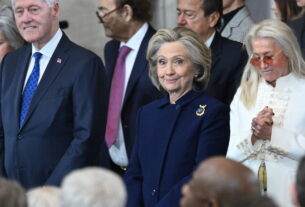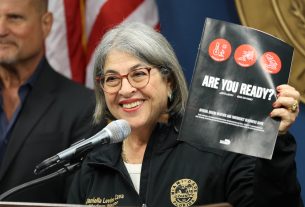((JEWISH REVIEW)) — Israel, which featured large in the first Republican debate, got nary a mention in its sequel on Wednesday night, as the candidates on stage in California instead sparred with each other over other issues.
Nikki Haley, the former South Carolina governor and ambassador to the United Nations, once again tangled with Vivek Ramaswamy, a businessman, but it was not over his proposal to wind down defense assistance to Israel, as it was in August at the first debate.
Instead, they fought over TikTok, the Chinese-owned social media platform which Ramaswamy has embraced as a means of reaching young voters and which Haley decries as an instrument of Chinese influence.
“Honestly, every time I hear you, I feel a little dumber,” she told Ramaswamy in one of the debate’s moments that set social media on fire.
The debate, often raucous, was broadcast by Fox News’ business channel, and Univision, a Spanish language network. Donald Trump, the former president who is leading in the primary polls by a huge margin, gave a competing speech in Michigan at the same time. He loomed over the proceedings, with a number of candidates taking shots at him for ducking the debate.
Iran, Israel’s deadliest enemy, scored a number of mentions for its role in backing and supplying Russia in its invasion of Ukraine. One of the most substantive splits among the seven candidates was whether to continue funding Ukraine’s defense, with Haley, former Vice President Mike Pence, South Carolina Sen. Tim Scott and former New Jersey Gov. Chris Christie embracing U.S. support for Ukraine, and Florida Gov. Ron DeSantis and Ramaswamny arguing that aid to Ukraine should end.
North Dakota Gov. Doug Burgum was the sole candidate on the stage at the Ronald Reagan Library in Simi Valley, California, who mentioned that Iran could soon pose a threat as a nuclear armed nation, an issue that Israel and its allies here believe should be front and center of U.S. foreign policy.
Burgum attacked the Biden administration for its recent prisoner exchange with Iran, which included the release of $6 billion in money South Korea owes to Iran for oil sales, which the Biden administration insists will only be used for humanitarian purposes.
“Six billion dollars, they traded for five people,” Burgum said, calling the Biden administration’s Iran policy “appeasement.” “They just now set a price on anyone’s head who is a tourist from America, who’s a student from America, for kidnapping — if you want more kidnapping, put a price on it. And they’re also helping Iran get to have, get more closer to a nuclear weapon.”
Ramaswamy attacked Ukraine’s Jewish president, Volodymyr Zelensky, noting that he had saluted a former Nazi in the Canadian parliament last week. “This is a country whose president just last week was hailing a Nazi,” he said.
There is no evidence that Zelensky knew that the man, who was invited by the Canadian Parliament speaker, had a Nazi background. The speaker said he had not known the man’s background and resigned as a result of the ensuing scandal.
DeSantis once again invoked George Soros, the Jewish progressive megadonor who is a frequent target of the right and of antisemitic conspiracy theories. Soros has funded election campaigns for progressive prosecutors. DeSantis has sacked two elected prosecutors in his state for being too liberal, and he said he would take the same fight to the White House.
“I will use the Justice Department to bring civil rights cases against all of those left-wing Soros-funded prosecutors,” DeSantis said. “We’re not going to let them get away with it anymore.”
Also missing from the debate was any discussion of antisemitism, which Jewish organizations say has spiked in recent years and which is the focus of a major strategy rolled out this summer by the Biden administration. The moderators also did not raise the four criminal indictments Trump is facing, including charges related to his efforts to overturn the 2020 election.




